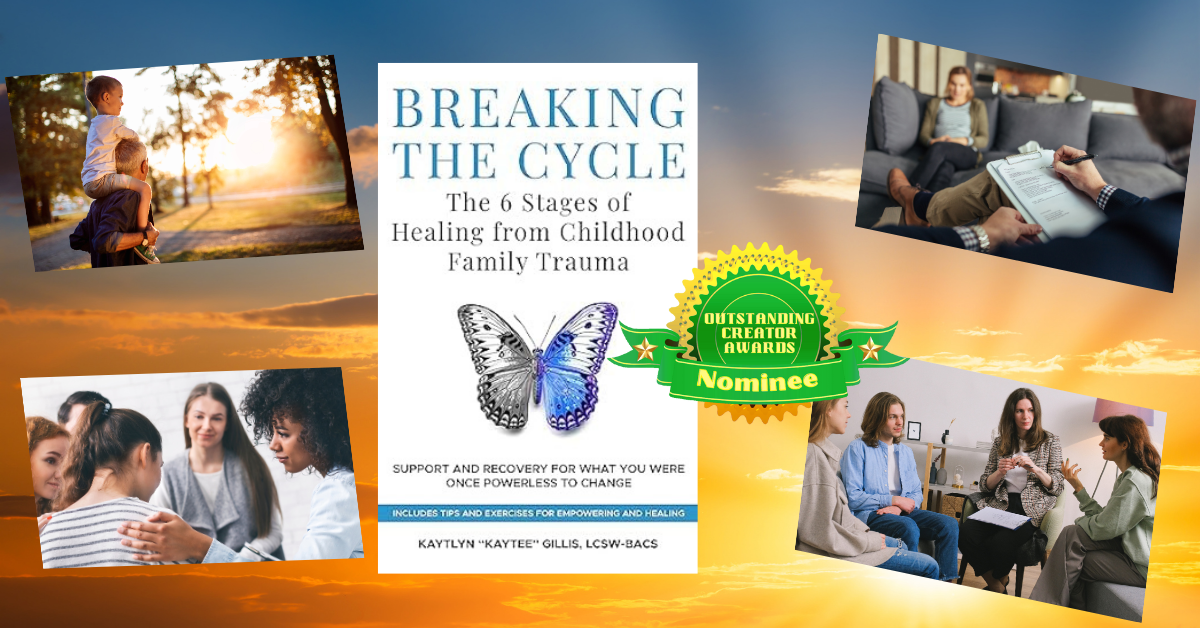|
Score: 95/100 (9.5 out of 10)
Breaking the Cycle: The 6-Stages of Healing from Childhood Family Trauma is an excellent self-help & psychotherapy book by Kaytee Gillis. Gillis is an experienced and well-respected psychotherapist who specializes in helping people to overcome childhood emotional trauma, family dysfunction, traumatic relationships, and separation abuse (among other things). She even has her own blog on Psychology Today, a highly respected and often-quoted medium among scholars. Gillis brings years of experience together to present the audience with great case studies, workbook activities, education, and inspiration that all come together to achieve one key purpose: to BREAK THE CYCLE of trauma that is keeping us from living our happiest, best, and most fulfilled life. This is all necessary in the process of HEALING. Like many psychotherapists, Gillis seems to focus on two key areas: childhood and relationships. In a sense, it's a classical Freudian approach, however, with a much more gentle and personal touch. While Freud obsessed over some pretty gnarly stuff (like stamping people with one complex/label or another), Gillis is much more concerned with the individual and their unique struggle outside of their sexuality and dreams. In a sense, she presents a very grounded psychoanalytical approach. This book does a great job at addressing those suffering from various kinds of trauma. However, we wanted to mention that we felt like this book would be most useful for parents, particularly new parents. Why? Well, it focuses so heavily on the relationships between parents and their children, particularly in child-rearing. It is a powerful and important reminder why parents should be attentive, compassionate, patient, and loving. That sounds simple, but it's easier said than done. The temptation to be neglectful, severe, or even abusive can be great due to the fact that these methods seem to “work” faster and more efficiently. Yes, you might be able to get the results you want if you beat it into someone, but there are far-reaching consequences to that. Children of parents who are neglectful, severe, or abusive are more likely to develop psychological and personality disorders. They are more likely to be depressed or anxious. They are more likely to turn to drugs (and other addictive behaviors like drinking) as a means of coping. Furthermore, they are more likely to be distant, detached, and opposed to forming/keeping relationships, that includes their relationships with you as a parent. So, while you might think that forcing a child to do things your way through severe discipline is a shortcut to their compliance and success, think again! It might come around to bite you. If you think it's easier just to leave your child and walk away from your parental responsibilities, think again! It might come back to bite you. In fact, it very likely will. One of our favorite aspects of this book are the discussions of a concept called “family dysfunction.” We've all heard of dysfunctional families. Some of us have felt like we live in one (or have lived in one). However, it's actually comforting to note that this isn't weird, strange, or even unusual. In fact, it's fairly normal for a family to experience imperfections, conflicts, and dysfunctions. It's not the end of the world. Some of our favorite quotes from this book are: “All families are different, and no family is perfect or completely void of dysfunction” and “All families are dysfunctional” (although this latter quote is treated as wrongfully dismissive). However, there's truth and some comfort in knowing this. Now, that's not to say that families have to continue to be so dysfunctional and conflict-prone. In fact, the author encourages families to work through their problems/issues rather than ignoring, dismissing, or bottling them up. Families, like all groups, all teams, and people in all relationships, should be working to do better and better each day. Acknowledging, addressing, and working on problems/issues is part of the healing process, and it's good for everyone's overall outlook on life. The same is true for feelings and emotions. Don't ignore them. Don't bottle them up. Don't think that they'll just go away. Develop positive, healthy ways of expressing and working through these feelings and emotions. Having read a lot of autobiographies and memoirs about trauma and abuse, we've developed a unique appreciation of dealing with these things. Of course, a few of us have had traumas of our own such as car accidents and violence. So, we could appreciate this book from a personal perspective as well as form the perspectives of other sufferers. Check it out on Amazon!
0 Comments
Leave a Reply. |
Archives
July 2024
Categories |

 RSS Feed
RSS Feed